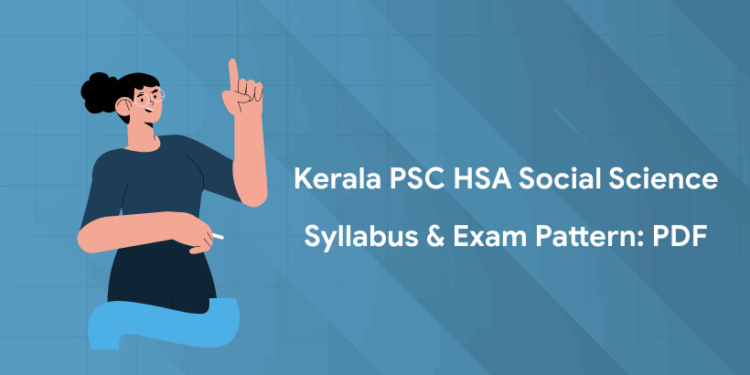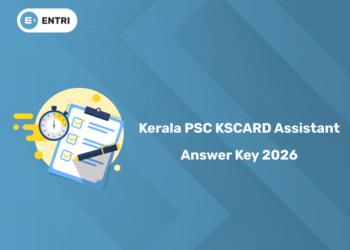Table of Contents
The Kerala PSC HSA Social Science exam has been announced, and the official syllabus is now released. While candidates wait for further updates, they can start preparing using the newly released syllabus. Begin your preparation early, understand the exam pattern, and strengthen your knowledge in social science to stay ahead and perform your best. Download the syllabus now!
Kerala PSC HSA Social Science Recruitment 2025: Highlights
| Kerala PSC High School Teacher Social Science Notification 2025 | |
| Job Type | Government Job |
| Post Name | High School Assistant |
| Category Number | 024/2025 |
| Subject | Malayalam |
| Exam Date | November 04, 2025 |
| Admit Card | October 21, 2025 |
| Exam Mode | OMR |
| Total Marks | 100 |
| Official Website | www.keralapsc.gov.in |
Kerala PSC HSA Social Science Previous Question Papers 2025 – Free PDF
1: The first recipient of the ‘Rajiv Gandhi Khel Ratna’ award?
| Subject | Medium |
| 125/2016 | |
| 126/2016 | |
| 127/2016 |
Enroll in Kerala's Top-rated HSA Coaching Program!
സർക്കാർ ജോലി എന്ന സ്വപ്നം ഇനി സ്വപ്നം മാത്രമല്ല! Join Entri's HSA Coaching Program
Join Now!Kerala PSC HSA Social Science Syllabus 2025 PDF
The Kerala PSC High School Assistant (HSA) Social Science exam has been announced, and the official syllabus is now available. Aspirants are encouraged to begin their preparation immediately.
Candidates can start studying using the officially released syllabus, which covers all the relevant topics. The syllabus is provided below for your reference.
Kerala PSC HSA Social Science Exam Pattern 2025
The Kerala PSC High School Assistant (HSA) Social Science exam is conducted in offline mode as an objective-type test. Candidates will face a total of 100 multiple-choice questions, each carrying 1 mark. The total duration of the exam is 1 hour and 30 minutes.
- Duration: 1 hour 30 minutes
- Mode: Offline (OMR-based)
- Type: Multiple Choice Questions (MCQs)
- Negative Mark: 1/3 Marks
Detailed HSA Social Science Exam Pattern:
| Part | Subjects | Marks |
|---|---|---|
| Part I | Renaissance and freedom movement, General Knowledge and current affairs | 15 marks |
| Part II | Teaching Methodology | 5 marks |
| Part III | Social Science (Main Subject) | 80 marks |
| Total | 100 marks |
Kerala PSC HSA Social Science Expected Syllabus 2025 – Detailed
The official Kerala PSC High School Teacher Social Science syllabus is now available, covering all essential topics for the exam. It includes both teaching methodology and subject-specific content such as Indian and World History, Geography, Economics, Sociology, Political Science, and Educational Psychology. Candidates can refer to the detailed syllabus below
Part I- Renaissance and freedom movement, General Knowledge and current affairs (15 Marks)
Part II- Methodology of teaching the subject ( 5 Marks)
- History/conceptual development. Need and Significance, Meaning Nature
and Scope of the Subject. - Correlation with other subjects and life situations.
- Aims, Objectives, and Values of Teaching – Taxonomy of Educational Objectives – Old and revised
- Pedagogic analysis- Need, Significance and Principles.
- Planning of instruction at Secondary level- Need and importance. Psychological bases of Teaching the subject – Implications of Piaget, Bruner, Gagne, Vygotsky, Ausubel and Gardener – Individual difference, Motivation, Maxims of teaching.
- Methods and Strategies of teaching the subject- Models of Teaching, Techniques of individualising instruction.
- Curriculum – Definition, Principles, Modern trends and organizational approaches, Curriculum reforms – NCF/KCF.
- Instructional resources- Laboratory, Library, Club, Museum- Visual and Audio-Visual aids – Community based resources – e-resources – Text book, Work book and Hand book.
- Assessment; Evaluation- Concepts, Purpose, Types, Principles, Modern techniques – CCE and Grading- Tools and techniques – Qualities of a good test – Types of test items- Evaluation of projects, Seminars and Assignments – Achievement test, Diagnostic test – Construction, Characteristics, interpretation and remediation.
- Teacher – Qualities and Competencies – different roles – Personal Qualities – Essential teaching skills – Microteaching – Action research
PART B
Module I
- Definitions of History
- Bronze Age Civilizations – Egyptian, Mesopotomian, Harappan Civilizations
- Graeco-Roman Civilizations
- Renaissance, Reformation, Geographical discoveries.
- Modern Revolutions – English, French, Russian Revolutions and Industrial Revolution.
- World Wars – League of Nations and United Nations
Module II
- Vedic Age, Jainism and Buddhism.
- Mauryas and Guptas.
- State and Society in medieval India – Sultanate, Mughal and Vijayanagar.
- Advent of Europeans – Birth and Growth of British power in India – Impact of Colonialism.
- Emergence of Nationalism – Struggle for Freedom – Partition of India.
- Sources of Kerala History – Jainism and Buddhism in Kerala
- Kerala in the Sangam Age – Perumals of Mahodayapuram – Bhakti
Movement. - Rise of Modern Travancore – Resistance against Colonialism – Pazhassi Raja, Velu Thambi and Paliyathachan.
- Renaissance in Kerala – Social and Religious reform movements.
- National Movement in Kerala – Aikya Kerala Movement – Formation of Kerala State.
Module III: Economic Theory, Banking and Tools of Analysis
Issues and Concepts in Economics – Theories of Consumer Behaviour: Cardinal and Ordinal Approaches – Elasticity of Demand – Production and Cost Functions National Income Concepts – Sectoral Composition of GDP – – Theories of International Trade: Absolute cost Advantage – Comparative Cost Advantage – Commercial banks and Central bank: Role and Functions. Application of measures of Central Values, Dispersion and simple Correlation in economics
Module IV: Indian economy, Development Economics, Public Finance and Kerala Economy
Overview of Indian economy – Economic Planning – Five Year Pans in India- Major Development Issues: Poverty, inequality, unemployment – Concepts of Human Development: Measurement of Development – PQLI, HDI – Concept of sustainable development – Structure of Taxes and Expenditure of the Government – Concepts of Federal Finance – Development Experience of Kerala – Demographic transition, gender issues, migration and urbanization
MODULE V
- Meaning, importance and approaches to the study of Political Science
- Major concepts in Political Science- state, civil society, sovereignty
- Political culture, political socialization
- Federalism, rule of law, judicial review, Judicial activism,
- Role of Political parties and pressure groups
- Democracy- meaning and features – Direct and Indirect democracy – Parliamentary and Presidential systems
- Indian political system: salient features of the Indian Constitution, Fundamental Rights and Directive Principles of State Policy. Working of Union and State Governments: A brief analysis
- Human Rights- Meaning and importance, Universal Declaration of Human Rights
MODULE VI
- International Politics and Organizations. Diplomacy, Foreign Policy, Collective Security, Disarmament and Arms Control. UNO-Principal organs and functions. New trends: Globalization, WTO.
- Public Administration. Principles of Organization, Bureaucracy: merits and demerits, New Public Administration, New Public Management, Development Administration, Significance of Local Self Government Institutions in India.
- Political Thinkers. Plato, J S Mill, Aristotle, Rousseau, Marx, Gramsci and Gandhiji: Major contributions
Module VII – Physical Geography
Solar System and Planets – latitudes and longitudes – time – seasons – maps, map scales – basics of remote – structure of the earth – continents and oceans – continental drift – plate tectonics – rocks – weathering and erosion – fluvial, glacial, Aeolian, landforms. Composition and structure of atmosphere – temperature and their distribution – pressure belts, winds – condensation and precipitation – Major oceans and their characteristics – tides and currents.
Module VIII – Human and Regional Geography
Population – World population distribution, growth – migration – settlements – rural and urban – climatic regions of the world – Types of agriculture in the world –
distribution of iron ore and coal in the world– distribution of industries in the world – iron and steel – cotton textiles. Physiography of India – drainage – climate – soils – forests – Distribution, growth and density of population in India – Distribution of rice, wheat, cotton and sugar cane in India. Irrigation and multipurpose projects of India. Distribution of iron ore, coal, bauxite, mica, petroleum and atomic minerals – nonconventional energy resources – Distribution of iron and steel, textiles, and agro based industries in India – Transport in India – Geography of Kerala
Enroll in Kerala's Top-rated HSA Coaching Program!
സർക്കാർ ജോലി എന്ന സ്വപ്നം ഇനി സ്വപ്നം മാത്രമല്ല! Join Entri's HSA Coaching Program
Join Now!How to Download Kerala PSC HST Social Science Syllabus 2025
- Go to the Official Kerala PSC Website:
Visit https://www.keralapsc.gov.in - Click on the ‘Downloads’ Tab on the homepage.
- From the dropdown, select ‘Syllabus’.
- Look for the section named ‘Teaching Posts’ or directly search for HSA Social Science in the syllabus list.
- Click on ‘HSA Social Science Syllabus’.
- Finally, click the Download button to save the syllabus PDF to your device.














